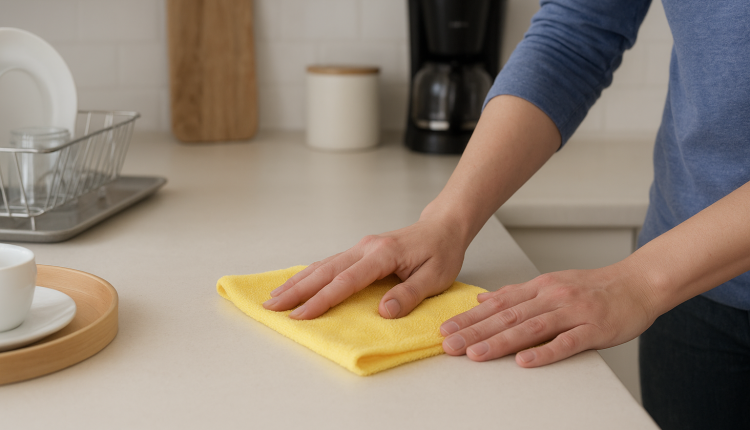Organize While You Wait: Small Intervals, Big Impact
When most people think about getting organized, they imagine long, dedicated sessions: weekend decluttering, deep-cleaning marathons, or hours spent sorting paperwork. But real life is filled with brief, in-between moments — five minutes while the pasta boils, seven minutes before you need to leave the house, ten minutes waiting for a child to finish getting ready, or the length of a laundry cycle before the buzzer rings. These small pockets of time often slip away unnoticed, even though they represent a powerful opportunity to build lasting order and reduce daily stress.
“Organize while you wait” is not about multitasking or rushing. It’s about using micro-moments intentionally to reset your environment so that clutter never gets a chance to accumulate. When done consistently, these small actions create a surprising level of calm, reduce decision fatigue, and prevent those overwhelming cleaning sessions altogether. Here’s a deep dive into why this method works, what tasks fit best into short intervals, and how to turn everyday waiting into a personal efficiency habit.
Why Micro-Organization Works
Short bursts of organization rely on a psychological advantage: low resistance. A task that takes less than two minutes feels manageable, even inviting, compared to a large task that requires time and energy you may not have. This helps bypass procrastination and builds momentum toward a tidier home without triggering stress or perfectionism.
Micro-tasks also support cognitive offloading — freeing your brain from the small visual distractions of clutter, which research shows can elevate cortisol, reduce focus, and increase feelings of overwhelm. Resetting small areas throughout the day means your environment regularly returns to baseline order, making your home feel easier to manage overall.
Lastly, weaving organization into waiting periods replaces passive time (scrolling, pacing, staring at the oven timer) with something that has an immediate payoff. These micro-wins reinforce a sense of productivity and confidence, especially for people balancing work, family, and limited free time.
Room-by-Room Waiting Hacks
Kitchen: While Something Cooks, Reset Your Space
The kitchen naturally generates many waiting moments: preheating, simmering, heating leftovers, brewing coffee. Use these tiny intervals to maintain control over the busiest room in the home. For example:
- Wipe countertops instead of letting spills dry and attract grime.
- Unload or reload the dishwasher while water boils.
- Declutter the fridge door by removing expired coupons or old notes.
- Sort one drawer — utensils, towels, coffee pods, or food storage lids.
- Refresh your sink by rinsing dishes or spraying it with cleaner.
A few minutes of consistent resets keep the kitchen from turning into a nightly disaster zone.
Living Room: During Commercials or Child Play Pauses
This space tends to accumulate everyday clutter — blankets, remote controls, cups, toys. When you’re waiting for a video to load or for a child to finish an activity, try:
- Folding blankets and straightening pillows.
- Gathering stray items into a small basket to sort later.
- Dusting surfaces that only take seconds but make the whole room feel cleaner.
- Returning books or chargers to their designated spots.
These small steps prevent the living room from becoming a catch-all space.
Bedroom: Before Bed or While Getting Dressed
Bedrooms often get less attention because we spend minimal waking hours in them. Yet a messy bedroom contributes to restless sleep and morning frustration. Use tiny transitions:
- Make the bed while waiting for your clothes to steam.
- Clear the nightstand of cups, tissues, or old receipts.
- Organize a single drawer — socks, underwear, or accessories.
- Put away clean clothes instead of leaving them in a “temporary” chair pile.
Creating micro-order here supports better sleep and calmer mornings.
Bathroom: While Water Warms or Hair Dries
Bathrooms become cluttered fast, but micro-organization makes a huge difference:
- Wipe the sink while waiting for hot water.
- Sort expired products during hair-drying time.
- Refold towels or replace a used one with a fresh one.
- Clean the mirror in under 30 seconds.
Because bathrooms are small, even 90 seconds of effort can completely change the mood of the space.
Tech & Work: Productive Pauses While Loading or Updating
Digital clutter contributes to just as much stress as physical clutter. And devices give us constant waiting periods: pages loading, files exporting, apps updating, emails syncing.
Use these micro-moments to:
- Delete screenshots you no longer need.
- Unsubscribe from a few promotional emails.
- Reorganize desktop icons into folders.
- Clear your downloads folder — a common digital black hole.
These small tasks keep your work environment clear and reduce long-term digital chaos.
Micro-Tasks for Busy Parents
Parents often experience many short pauses — the minutes between kids putting on shoes or choosing inside-out clothing, snack requests, bathroom breaks, or school-day transitions.
These micro-interruptions are perfect for:
- Tidying a small toy basket.
- Wiping the dining table.
- Restocking wipes, diapers, or school lunch supplies.
- Rotating a few books on the shelf.
The key is choosing tasks that can be completed even if you get interrupted — nothing delicate or requiring sustained focus.
How to Build the Habit Without Feeling Overwhelmed
1. Keep tasks under three minutes
If it can’t be done quickly, save it for another time. Short tasks reduce resistance.
2. Don’t aim for perfection
The purpose is maintenance, not deep cleaning. “Good enough” resets are the goal.
3. Make tools accessible
Keep microfiber cloths, mini trash bags, and multipurpose spray in easy-to-reach places.
4. Pair tasks with cues
Waiting for water to boil? Wipe the counter. Phone updating? Clear the inbox.
Associating actions with triggers builds automatic habits.
5. Celebrate small wins
Noticing the immediate improvements keeps motivation high.
The Real Magic: Compounding Effects
The brilliance of “organizing while you wait” isn’t in any single action. It’s in the compounding effect of dozens of small resets each day. Over time, surfaces stay clearer, clutter stops accumulating, your home feels easier to maintain, and the stress of “I need to get organized” fades into the background.
You don’t need two hours. You just need the next 90 seconds.
This approach transforms everyday waiting into micro-moments of calm and control — a quiet, steady system that supports a home you enjoy living in.

